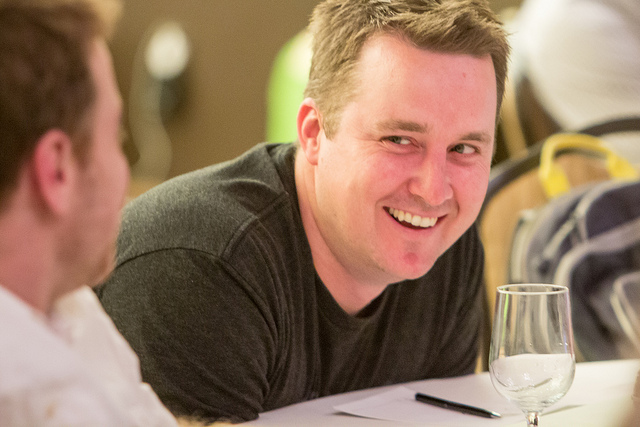A Bespoke Leadership Development Programme – 3 Questions To Ask
 Implementing a bespoke leadership development programme successfully takes skill.
Implementing a bespoke leadership development programme successfully takes skill.
Getting it right means higher levels of engagement with ever improving results across your whole organisation.
Get it wrong, and no matter how much money was spent, a year later the same leadership/management issues are at play.
Within this article we address three key questions which need answering before committing to such a process. What are you seeking to achieve? Is there a joined up strategy? Will the programme be transformational?
1. What are you seeking to achieve?
When planning a programme it is important to think wider than ‘improve communication skills’ or ‘to delegate more effectively’. Why are you looking for improvement, and to what end? What is the ultimate goal?
Any bespoke leadership development programme needs to be in context to the organisation’s vision, values and purpose. ‘We want to improve communication skills in order to be the number one customer service company’, or, ‘we want to improve delegation skills because our target is to double in size this year’ are good examples.
Without a clear vision of what you are looking to achieve, and how it will be measured, you risk failure. It becomes just another project with tick boxes, sucking time and money yet achieving precious little.
Examples of a bespoke leadership development programme’s objectives are below. Note how each has a way of measuring success.
- Increase levels of engagement across the organisation, as measured by engagement surveys
- Managers implement clear objectives, roles and responsibilities, accountability and measurements for all employees
- Improved communication – up, down and sideways
- Improved effectiveness – as measured by KPIs
- Improved management performance – as measured by 360 reviews
- Management behaviours improvements – as measured by EQ and other psychometric tools, including peer reviews.
2. Is there a joined up strategy?
Imagine two racing drivers. They both desire to improve their performance. Each takes a different strategy – which one is more likely to be successful? 
- Driver 1 looks in a car parts catalogue; buys some parts designed to improve performance such as bigger exhaust, a new turbo charger or better tyres.
- Driver 2 takes a holistic approach. He seeks to improve his own driving skills whilst seeking to upgrade the car as a whole. He improves engine performance but at the same time upgrades suspension, tyres and brakes.
Many companies are like driver 1. They send their managers away on training courses to address issues brought up in reviews. They select ‘Assertiveness Training’, or ‘Coaching for Performance’ from a management catalogue. This is a flawed approach for it doesn’t take into consideration the organisation as a whole. For more on this read my previous article: Don’t Train Your Managers.
Those that take driver 2’s approach recognise that a successful management development programme needs a joined up holistic strategy. Key development areas need to be implemented across the whole organisation.
If you want your middle managers to adopt a more coaching style to management, it is essential that the senior managers do the same. Simply sending your middle managers on a ‘manager as coach’ course is likely to cause frustration. They will judge their boss by their ability to coach and be found wanting.
A development programme will entail a plethora of applied tools, theories and latest thinking. They include psychometric tools, team diagnostics, coaching tools, interpersonal skills, organisational psychology. All provide a unique perspective on human and organisational behaviour. Each has its own language, nuances and impact.
When skilfully applied, managers see themselves and others in a different way. Previous conflicts are readdressed as differences in personality traits, team roles or priorities. Increased awareness results in new, more effective, behaviours. In other words the development process causes a new way of speaking, being and doing.
Those managers who have not engaged in the same process are at a disadvantage. Not only have they not completed the same self-development process, they don’t understand the tools, theories or language now adopted by others.
The more managers develop, the more they expect from senior management. If not careful, highly engaged managers become stymied and frustrated by more senior, less developed, managers. The result is disengagement. For this reason we strongly recommend any bespoke leadership development programme works with all levels of management, including the executive team.
Unless you are a smaller business, senior teams will not engage in the same management development process as more junior managers. It is important however that key learning and development themes are distilled (and applied) to the senior team. If senior managers don’t ‘walk the talk’ you are dead in the water before you start. After all, desired organisational behaviours start from the top.
So when looking for a bespoke management development programme, make sure it addresses all levels of managers within the organisation, and is tailored to each.
3. Will the programme be transformational?
A bespoke leadership development programme has the power to transform the organisation in a very positive way. See it as a change process, from ‘what is’, to ‘what is desired’.
Improved communication. Thinking strategically. Highly performing teams. Engaging and developing others. Effective delegation. All powerful desired outcomes.
At the heart of such change is increased awareness. Much as a mirror highlights a smudge on our face, a developmental programme focuses on self. Central to the process is understanding improving performance starts with ‘me’. I gain a better understanding of how I think, how I react, how I speak, how I engage or manage others and how I go about my work. I learn about my strengths, weaknesses and opportunities for development. I understand that others are different to me and bring different perspectives and strengths to the team.
It is building on these kinds of insights that truly transform our ability as managers and leaders.
The key to achieving this level of success is the skill and expertise of those who facilitate and deliver the programme. Their history, ability, personality, presence and focus on meeting your objectives is key. Their ability to win over the most skeptical of managers. To engage the whole group in a collective learning process. Skilfully dealing with the ‘elephants in the room’ and inter personal conflicts. Their ability to supportively yet robustly challenge ineffective behaviours in such a way that is non judgemental. To drive significantly improved leadership effectiveness.
If you are working with an external L&D partner, ensure you work with the person/people who will be involved in delivery from the outset. Don’t allow yourself to be sold to, then gain a middle of the road consultant who doesn’t have the requisite skill and passion for the job.
Ask to speak to previous customers and ask the question – what impact did this person have? Did he/she develop leaders or was it just theory? Did he/she drive management engagement within your organisation? Would you wholeheartedly recommend him/her/them to us?
Bespoke leadership development programme summary
Getting it right creates a powerful sense that ‘we are all in this together, to achieve something worthwhile’. Gaining such a perspective is highly motivational. It engages hearts and minds. The result is a collective sense of accountability, with a purposeful commitment to reaching objectives.
To ensure your bespoke leadership development programme meets your objectives and catapults your business towards its goals, make sure you are clear on the three questions:
- What are we seeking to achieve?
- Is there a joined up strategy?
- Will the programme be transformational?
We typically work alongside HR in engaging with the MD/CEO/board to gain top down buy in. Without it you will struggle. If you are looking for a proven partner who can help you ensure your programme delivers – please do call us.
I would love to hear your thoughts on this article. Do you agree with what I have written? Do you feel I have missed anything?
If you liked this article you might also like how to select an executive coach, don’t train your managers and the importance of vision in driving engagement.
Please do drop me a line at markb @ welcomeinsight.com
Mark Bateman has a Masters in Leadership Coaching and Mentoring, postgraduate qualifications in psychology and business coaching/mentoring. He works as an Executive Coach and designs/delivers leadership management development programmes. A successful entrepreneur, Mark has been supporting, facilitating and coaching leaders his whole adult life. Currently writing a book on purposeful visionary leadership. You can contact him at markb@welcomeinsight.com, or via +44 1332 424221.
(C) Welcome Insight 2016, Mark Bateman
Smiling Face Image: kris krüg on Flickr.
Mini Image: Jim Culp on Flickr


